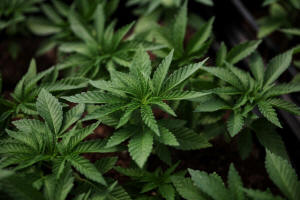Legal cannabis poses a quandary for US companies screening staff for
drugs
 Send a link to a friend
Send a link to a friend
 [October 06, 2022] By
Timothy Aeppel [October 06, 2022] By
Timothy Aeppel
(Reuters) - Workers at Wyatt Bassett's
furniture factory in Virginia use powerful tools to churn out the
company's trademark dressers and headboards, so screening new hires for
drugs is a no-brainer.
Or it used to be.
Virginia last year fully legalized marijuana — the first state in the
South to do so. The upshot is that "being positive for cannabis does not
necessarily disqualify you for employment," said Bassett, CEO of
Vaughan-Bassett Furniture Co., which has 575 employees.
Faced with a shortfall in applicants, employers across the U.S. are
balancing pressure to ease up on testing for a legal drug with concerns
that this could impact safety and raise issues of liability.

The U.S. jobless rate ticked up to 3.7% last month, but it remains near
a five-decade low.
"With the war for talent and the labor shortage, especially in some
lower paying jobs, it's tough to find and retain folks — so many are
deciding to not test, except for safety sensitive jobs," said Julie
Schweber, a senior knowledge adviser at the Society for Human Resource
Management. Companies with multiple operations in different parts of the
country face an added challenge, she said, because laws differ from
state to state.
The challenge of balancing workplace safety and the growing prevalence —
and legalization — of some types of drugs is especially acute for
manufacturers and others who use dangerous equipment.
Last June, Amazon.com Inc. said positive tests for marijuana use would
no longer disqualify people from jobs that are not regulated by the U.S.
Department of Transportation, such as truck drivers.
The e-commerce giant — like many other employers — said it will treat
cannabis like alcohol, even though traces of its use linger in the human
body far longer and can show up on some types of tests after a worker is
no longer impaired by its use. "We will continue to do impairment checks
on the job and will test for all drugs and alcohol after any incident,"
wrote former-CEO Dave Clark, in a blog post at the time of the
announcement.
Data from Quest Diagnostics, which handles testing for companies, shows
a steady increase in positivity rates for marijuana tests over the past
decade — coinciding with the wave of legalization. In 2012, only 1.9% of
workers not subject to federally mandated drug testing requirements
failed a pre-employment screening. Last year, that had grown to 4.1%.
The jump in positive tests after accidents grew even more during that
period, up from 2.4% to 6.7%.

[to top of second column] |

Marijuana plants for the adult
recreational market are seen inside a greenhouse at Hepworth Farms
in Milton, New York, U.S., July 15, 2022. REUTERS/Shannon
Stapleton/File Photo

The majority of Fortune 1000 companies have some type of screening
in place, but many companies are dropping cannabis tests from the
list, said Barry Sample, a senior science consultant who compiles
Quest's data. Still, Quest estimates between 30 to 35 million
employment-related drug tests are conducted in the U.S. annually.
Most of the tests Quest conducts use urine samples. Other tests rely
on swabbing saliva or hair samples. "None of this testing can say
whether someone is impaired," said Sample. Rather, the tests will
simply indicate the presence of the drug based on a pre-set
threshold.
Cannabis use for medical reasons is now legal in 37 states, while
recreational use is legal in 19. Quest's data also shows that states
that allow recreational use of cannabis have higher positivity
rates.
Sample said many employers are shifting screening efforts to focus
on drugs that remain illegal and where use in some industries also
appears on the upswing. In manufacturing, for instance, Quest found
the positivity rate clicked up last year for both methamphetamine
and cocaine.
Insurance experts say it is too early to see if the changes will
drive up insurance rates for companies that drop testing. "Nobody is
going to come out and say, 'We're increasing premiums because you
have more stoned workers on the job,'" said Mark Pew, a consultant
who specializes in workers' compensation insurance in Georgia. But
if, over time, companies that have looser drug screening policies
have higher accident rates than those who stick to tougher rules,
that could change, he said.
Matt Zender, a senior vice president for workers' compensation
strategy with AmTrust Financial Services Inc., said one factor that
may obscure or offset the impact of more drug use on the job is the
general move toward safer workplaces.

"If you just look at claims per 100 hours of work, overall people
are getting injured less often than they were in the past," he said.
Meanwhile, companies continue to fine tune their approaches on the
issue. A California manufacturer of plastic bags, contacted by
Reuters about their drug screening policies, was surprised to learn
that his human resources department was automatically rejecting
applicants who test positive for cannabis.
"My nephew would never get a job if I enforced that on him," Kevin
Kelly, CEO of Emerald Packaging Inc. in Union City, Calif., said in
an email. He said he had now directed his hiring managers to drop
the requirement, adding that workers at the factory are not allowed
to be impaired on the job. Cannabis use is fully legal in
California.
(Reporting by Timothy Aeppel in New York; Editing by Claudia
Parsons)
[© 2022 Thomson Reuters. All rights
reserved.]
This material may not be published,
broadcast, rewritten or redistributed.
Thompson Reuters is solely responsible for this content. |